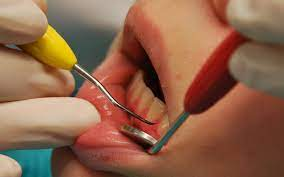Teeth scaling, also known as dental scaling, is one of the most effective ways to remove plaque and tartar from your teeth, which can significantly improve the look and feel of your smile. This procedure can also increase the amount of space between your teeth, which improves the flow of air into your mouth and reduces the likelihood of tooth decay and gum disease. For these reasons, scaling teeth should be part of your overall oral health routine at least once every six months, so you can have an attractive smile for life!
Know About The Importance Of Dental Hygiene
Cleaning your teeth is always important, but it’s especially crucial if you want to avoid any nasty cavities or other dental problems. One of your first steps should be regular brushing and flossing, but on occasion, you may need a more invasive procedure. Many of us don’t know when it’s time for scaling, so here are some signs that you need it done immediately
Problems Caused By Improper Plaque Removal
When plaque isn’t removed from teeth, it builds up on tooth surfaces and becomes tartar. Over time, tartar can stain your teeth and harden into calculus, leading to gingivitis, gum disease, and cavities. Worse yet: If you don’t have regular cleanings under general anesthesia (teeth scaling), diseased or abscessed teeth may need to be extracted.
What To Do If You Need A Dental Scale?
It can be pretty easy to look at someone’s smile and tell if they need scaling. If you have stains on your teeth, have cavities, or sensitive teeth, you might find yourself wondering whether you need scaling as well. Here are some signs that you might need a dental scale so that your dentist can give you advice.
Tips For Getting Through The Tooth Bleaching Process
Tooth bleaching can be an uncomfortable process, but it is well worth it if you want to have a brighter smile. Follow these tips to keep your mind off of how uncomfortable you are while getting your teeth bleached: Focus on what’s in front of you, not on what’s happening inside your mouth. If you’re reading or watching TV, try to focus on that rather than thinking about what’s going on with your teeth. Keep some sort of distraction nearby so that when you start feeling uncomfortable, you can grab it and focus on something else for a bit. If possible, ask someone else (preferably someone who doesn’t know anything about tooth bleaching) to sit with you during your appointment.
What Are The Risks Involved In Dental Bleaching?
If you’re looking to get whiter teeth, then you may want to consider getting dental bleaching. This is often used as an alternative to professional teeth scaling. To understand how well it works and what kind of risks are involved, keep reading. There are some things that must be taken into consideration before undergoing any type of treatment for your teeth. One is whether or not your teeth will react well to being bleached. A good dentist can advise you on which methods would work best for your situation and answer any questions that you might have about any possible side effects or risks associated with having these treatments done.
Tips For Choosing An Affordable And Reliable Dentist For Teeth Bleaching
There are numerous benefits to teeth bleaching, ranging from giving you a better smile to making your mouth feel cleaner. But before you choose an affordable and reliable dentist for teeth bleaching, it’s important to know what you’re getting into so that you can get exactly what you want out of it. Here are some tips for choosing an affordable and reliable dentist for teeth bleaching. 1) Find A Dentist That Is Licensed To Provide Teeth Bleaching Services: When searching for an affordable and reliable dentist for teeth bleaching, be sure to find one that is licensed by your state’s dental board to provide such services. It may seem like common sense, but not all dentists offer these services—so it is imperative that you check first.

Comments
Post a Comment